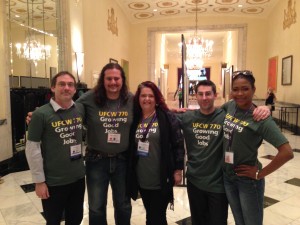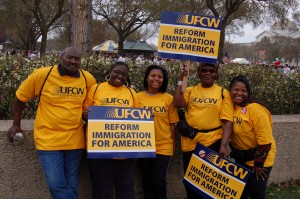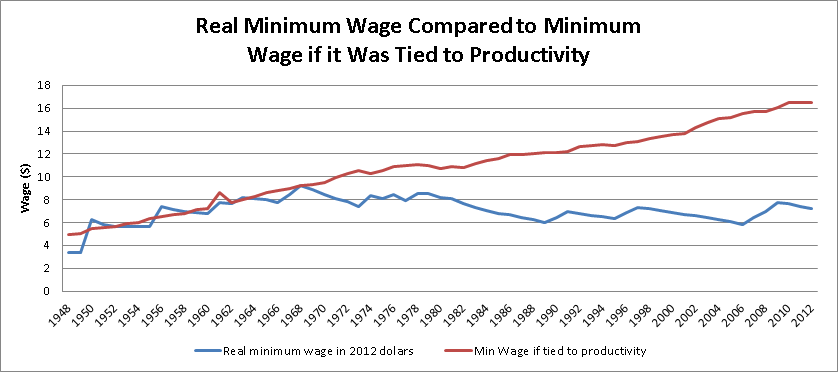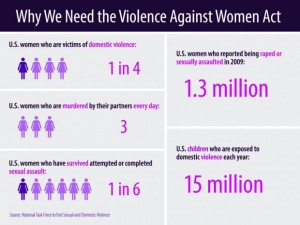February 27, 2013
UFCW Members Hold Lobby Days in Ohio and Kentucky

UFCW Locals 75 and 227 hold a lobby day in Frankfort, Ky., to
educate legislators on “no rights at work” legislation.
Last Wednesday, UFCW members and staff from UFCW Locals 75, 1059, and the RWDSU gathered to speak out against right-to-work legislation during a lobby day in Columbus, Ohio. Following trainings with UFCW local union and International staff on lobbying best practices, UFCW members went into their meetings with their state representatives and state senators.
“Reaching out to our legislators regarding issues important to working families is one of the most valuable things we can do,” said Local 1059 member Travis Long who works at Kroger. “It was great this year, and I look forward to more opportunities in the future.”
Both veterans of past lobby days and first-timers reported they had a positive experience. Many legislators requested more information on UFCW issues and several scheduled follow-up meetings back home in their districts to continue the dialogue with UFCW members.
Also that day, hundreds of UFCW Local 75 and 227 members educated their legislators about “no rights at work” legislation during a lobby day in Frankfort, Ky. Speaker Pro Temp. Larry Clark welcomed UFCW members to the Capitol and spoke against “no rights at work”.
The following day UFCW allies in the House Labor and Industry Committee exposed the flawed arguments of “no rights at work” proponents. Members also stood in solidarity with their brothers and sisters from the Kentucky Trades against an effort to remove prevailing wage from school projects.
Members ended the day with thank you letters to the legislators they had visited, along with “sorry I missed you” notes to legislators they were not able to reach. “Lobby day is a time for legislators to hear what is important to UFCW members,” said Jeff Pleasant, assistant chief steward at JBS. “Our lobby day has grown every year, and we will continue to fight to keep ‘no rights at work’ out of our state.”
February 26, 2013
UFCW Medical Cannabis Members Attend National Conference to Educate Members of Congress

UFCW members in the medical cannabis industry discussed strategies to protect workers at the National Unity Cannabis Conference.
UFCW members in the medical cannabis industry from Locals 5 and 770, along with medical cannabis staff from UFCW Locals 7 and 881, gathered in Washington, D.C., to share ideas with other medical cannabis activists at the first National Unity Cannabis Conference.
The conference featured medical and legal experts, elected officials, as well as seasoned advocates from the U.S. and overseas. It was an opportunity for UFCW members to discuss Labor’s role in the medical cannabis industry and how to develop strategies that protect the interests of workers as the industry continues to grow.
Today, 18 states and the District of Columbia allow legal access to medical marijuana for over one million Americans whose doctors have recommended it. In those states, UFCW members work in accordance with state laws to provide safe access to medical treatment for qualifying patients.
UFCW members ended the conference on Monday with lobby visits on Capitol Hill to educate their representatives in Congress about the impact of the conflict between state and federal medical laws on workers’ job security. They also urged the representatives to support proposed legislations HR 710 and HR 689 designed to provide for the rescheduling of medical marijuana and for an affirmative defense for the medical use of medical marijuana.
“The conference was very helpful to us,” said Jeff Jones, a UFCW Local 5 member who works at the Patient ID Center in Oakland, Calif. “UFCW members have a lot of work to do to educate Congress about the challenges that we face as workers in the medical marijuana industry.”
“Our goal is to give them the dignity that their sincerity deserves,” said Dan Rush, director of the medical cannabis and hemp division of the UFCW, in regards to workers in the medical cannabis industry. He added, as noted in a Bloomberg article, that “this is a growth industry, and people are looking for jobs.”
February 22, 2013
Over 80 UFCW Leaders Announce Support For Comprehensive Immigration Reform
 WASHINGTON, D.C. — Over 80 leaders of the United Food and Commercial Workers International Union (UFCW) from across the United States today wrote President Obama in support of comprehensive immigration reform.
WASHINGTON, D.C. — Over 80 leaders of the United Food and Commercial Workers International Union (UFCW) from across the United States today wrote President Obama in support of comprehensive immigration reform.
“As leaders of the (UFCW) from every corner of America, we strongly support your call for comprehensive immigration reform,” the letter read. “The time to create a principled, legal immigration system that treats all immigrants with respect and dignity is right now.”
The UFCW has been a leader on immigration reform for decades. Following the raids of Swift plants in 2006, the union spearheaded a national commission to investigate whether U.S. Immigration and Customs Enforcement (ICE) violated the due process rights of workers.
“Immigration is very personal to us,” said UFCW International President Joe Hansen, who joined President Obama last month in Las Vegas when he unveiled his comprehensive immigration reform plan. ”We remember the ICE raids where our members were treated like criminals. We remember the hearings that followed where we heard the stories of workers terrorized just for doing their jobs.”
“It doesn’t make sense for our country to spend billions of dollars breaking up families, harassing workers, and deporting people who are simply trying to achieve the American Dream,” Hansen continued. “2013 is the year for comprehensive immigration reform.”
The UFCW supports reform that includes a roadmap to citizenship for those already here, an effective mechanism for determining employment eligibility, smart and humane border enforcement, streamlined family reunification, and a fair process for allocating employment based visas.
“(Immigrants) work hard, pay taxes, and make our communities stronger,” the letter from UFCW leaders read. “Yet despite these important contributions, they are too often cast into the shadows. Our future success as a nation depends upon the ability of these immigrants to become full American citizens.”
February 22, 2013
UFCW Kicks Off Campaign for National Comprehensive Immigration Reform
The UFCW recently kicked off its public campaign for comprehensive immigration reform. Civil Rights and Community Action Department Director Esther Lopez says she expects a bill to be introduced in March or April, followed by hearings in May or June, and a vote in August.
In addition, over 80 UFCW leaders have signed a letter to President Obama in support of comprehensive immigration reform.
“The time to create a principled, legal immigration system that treats all immigrants with respect and dignity is right now,” the letter read.
 Immigration reform rallies are being planned across the country. If you live near any of these major cities, be sure to support the cause! And if you don’t, gather a group of coworkers and friends and let political leaders in your area know that the time for immigration reform is now.
Immigration reform rallies are being planned across the country. If you live near any of these major cities, be sure to support the cause! And if you don’t, gather a group of coworkers and friends and let political leaders in your area know that the time for immigration reform is now.
The scheduled rallies are as follows:
l February 25: San Francisco
l February 28: Houston
l March 6, 12, or 13: Minneapolis/St. Paul
l March 7: Chicago
l March 11: Phoenix
l TBD: New York City
February 21, 2013
UFCW Pushes for Part-Time Worker Bill of Rights
 Last week, Congresswoman Jan Schakowsky (D-Ill.) introduced the Part-Time Worker Bill of Rights which would help eliminate the incentive for employers to drop health coverage for their part-time workers. The Affordable Care Act (ACA) penalizes employers who fail to provide health insurance to full-time workers but includes no such penalty for part-timers (defined as working less than 30 hours a week).
Last week, Congresswoman Jan Schakowsky (D-Ill.) introduced the Part-Time Worker Bill of Rights which would help eliminate the incentive for employers to drop health coverage for their part-time workers. The Affordable Care Act (ACA) penalizes employers who fail to provide health insurance to full-time workers but includes no such penalty for part-timers (defined as working less than 30 hours a week).
This loophole has driven some national employers to announce plans to reduce workers’ hours in order to avoid the penalty. Walmart dropped part-time health coverage last year. The Part-Time Worker Bill of Rights seeks to level the playing field and protect the millions of part-time workers in retail and other service industries.
Workers are encouraged to contact their Members of Congress this week while Senators and Representatives are in their home states and districts. You can find the full text of the bill here.
The UFCW continues to use every avenue possible—whether through the regulatory process or legislation—to strengthen the ACA and protect quality, union-negotiated health benefits. The Part-Time Worker Bill of Rights is a part of that effort.
February 13, 2013
UFCW Members Make Valentine’s Day a Little Sweeter
According to the National Retail Federation, Americans will spend $1.6 billion on candy this year to celebrate Valentine’s Day. UFCW members across the country, along with members of many other unions, have worked hard to make this holiday a little sweeter this year, by helping to create your favorite candy, chocolate, gifts, and other Valentine’s day products! Refer to the list below, brought to you by Labor 411 to help you find last-minute, union-made goodies.
Chocolate:
- See’s Candy
- Russell Stover
- Ghirardelli Chocolates (UFCW)
- Hershey Kisses and Hugs
- Necco Sweethearts
- Tootsie Rolls
- York pepper mint patties
Champagne:
- Andre (UFCW)
- Cook’s (UFCW)
- Eden Roc (UFCW
- J. Roget (UFCW)
- Jacques Bonet (UFCW)
- Jacque Reynard (UFCW)
- JFJ (UFCW)
- Le Domaine (UFCW)
- Tott’s
- Wycliff (UFCW)
C0logne and Perfume:
- Hugo Boss
- Pierre Cardin (UFCW)
- Avon (UFCW)
- Old Spice (UFCW)
Making dinner for your Valentine? Then pick up what you need from a union grocery store near you, with the help of the UFCW mobile app. Then pick out some union-made wine to go with it!
You can also make these Chocolate Peanut Butter cupcakes with the union-made ingredients provided in the recipe for your sweetheart. You’ll be sure to impress.
And if you really screwed up last V-day, why not purchase some jewelry from fellow union members at department stores like Macy’s?
We hope that with the help our our tips, you and your honey have a happy, union-made Valentine’s Day!
February 13, 2013
Statement By the United Food and Commercial Workers International Union Regarding the Minimum Wage Debate
 Washington, D.C. – The following is a statement issued by the United Food and Commercial Workers International Union:
Washington, D.C. – The following is a statement issued by the United Food and Commercial Workers International Union:
“In his State of the Union Address, President Obama made it clear that raising our country’s federal minimum wage to $9.00 an hour from the current rate of $7.25 was one of his top priorities, and a recent Pew survey has found that his proposal to raise the minimum wage has wide support among the American people.
“Despite widespread public support, President Obama’s push to raise the minimum wage has been opposed by big business and House Republicans, including Speaker John Boehner, who claimed that increasing the minimum wage would hurt our economy. While raising the minimum wage is not a perfect solution and will not lift all Americans out of poverty, a minimum wage increase would improve the standard of living for millions of American workers and give them the purchasing power that is needed to revive the economy.
“As President Obama noted in his State of the Union address, no American working a full-time job should be living under the poverty line. The UFCW applauds President Obama’s effort to close the gap between the rich and the poor by raising the minimum wage. The wasted economic potential of the millions of Americans who are struggling to survive in low-wage sectors is a national tragedy, and our 1.3 million member union will continue to stand with President Obama during the fight to lift American workers out of poverty and provide them with a pathway to the middle class.”
###
The United Food and Commercial Workers International Union (UFCW) represents more than 1.3 million workers, primarily in the retail and meatpacking, food processing and poultry industries. The UFCW protects the rights of workers and strengthens America’s middle class by fighting for health care reform, living wages, retirement security, safe working conditions and the right to unionize so that working men and women and their families can realize the American Dream. For more information about the UFCW’s effort to protect workers’ rights and strengthen America’s middle class, http://www.ufcw.org/, or join our online community at http://www.facebook.com/ufcwinternational and https://twitter.com/UFCW.
February 11, 2013
Why the Violence Against Women Act Needs to be Reauthorized. Now.
Three women a day are killed as a result of domestic violence. Every one out of five women are raped in their lifetime. These sobering statistics are why reauthorization of the Violence Against Women Act (VAWA) should be above petty politics. Unfortunately, House Republicans are casting aside their moral compass for their political one and women across the country are being left vulnerable.
The annual incidence of domestic violence has decreased by more than 53 percent since VAWA became law in 1994 and reporting by victims has also increased by 51 percent. This dramatic improvement helps explain why the VAWA has been reauthorized twice since 1994 without controversy.
The latest version of the bill, which has bipartisan support in the Senate from Democrats and Republicans, broadens the law by expanding its provisions to cover Native Americans, gays, and lesbians. The bill would also give more emphasis to sexual assault prevention and take steps to reduce the rape kit backlog.
While the bill is expected to pass in the Senate with bipartisan support, House Republicans are balking at the prospect of allowing tribal courts to prosecute non-Native Americans who commit domestic and sexual violence on reservations. Perhaps they should look at the statistics.
Compared with other groups, Native American women are more likely to be raped and abused. The National Congress of American Indians released findings that showed 39 percent of American Indian and Alaska native women will experience violence by a partner in their lifetimes.
Currently, non-Native Americans who abuse their spouses often go unpunished because federal authorities don’t have the resources to pursue misdemeanors committed on reservations.
At UFCW, we have a long, proud history of standing up for fair and equal treatment of all workers both inside and outside of the workplace. Expanding the VAWA to Native Americans, gays, and lesbians isn’t just an essential step towards ensuring the domestic abuse crisis in this country is met, it’s also the right and fair thing to do.
Moderate House Republicans should call on their leadership to pass the bipartisan Senate bill as soon as they are able. Lives are depending upon this bill getting off the back burner and passing. The battered and abused don’t have time for these political games.




